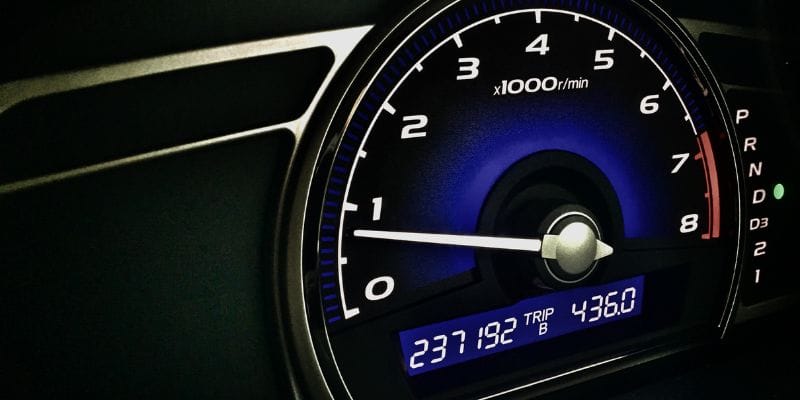What’s the Max Mileage on a Car: Unveiling the Longevity Secrets
The maximum mileage on a car varies depending on factors such as maintenance, driving conditions, and the car’s make and model. Generally, modern cars can last up to 200,000 miles or more with proper care and maintenance.
Factors such as regular oil changes, timely repairs, and gentle driving can prolong a vehicle’s lifespan. As technology advances, car manufacturers are producing more reliable and durable vehicles, allowing them to achieve higher mileage before major repairs are needed. However, it’s essential to note that individual driving habits and maintenance practices play a crucial role in determining how long a car can last.
By understanding these factors, car owners can make informed decisions to maximize their vehicle’s longevity and performance.
Cognizance The Role Of Mileage In Car Longevity
Understanding the role of mileage in car longevity is crucial for determining the maximum mileage a car can endure. Regular maintenance, driving habits, and the vehicle’s make and model all play a significant role in how many miles a car can potentially reach.
Keeping these factors in mind can help extend a car’s lifespan.
When considering purchasing a used car, mileage is often a crucial factor in decision-making. Understanding how mileage affects a car’s longevity is essential for making an informed choice. Factors such as engine wear and tear, maintenance history, and driving conditions play a significant role in determining a car’s durability.
Factors That Influence a Car’s Longevity
Engine Wear and Tear
The mileage on a car directly impacts the wear and tear on its engine. Higher mileage generally means more stress and strain on the engine components, ultimately affecting its longevity. Regular maintenance and timely servicing can help mitigate the wear and tear caused by high mileage.
Maintenance History
The maintenance history of a car has a direct correlation with its longevity. Regular oil changes, fluid checks, and scheduled tune-ups can significantly extend the lifespan of a vehicle, regardless of its mileage.
Driving Conditions
The driving conditions a car has been exposed to also play a crucial role in its longevity. Frequent stop-and-go traffic, harsh weather conditions, and rough terrain can contribute to increased wear on the vehicle, even at lower mileage.
In conclusion, understanding the role of mileage in a car’s longevity is crucial for prospective car buyers. By considering factors like engine wear and tear, maintenance history, and driving conditions, individuals can make informed decisions when purchasing a used car.

Myth Busting: Debunking Common Misconceptions About Car Mileage
Welcome to our myth-busting blog post where we will debunk common misconceptions about car mileage. In this article, we will address the myth that high mileage equates to poor condition, explore the reality of well-maintained high-mileage cars, and provide case studies of high-mileage vehicles.
Addressing The “high Mileage = Poor Condition” Myth
There is a prevailing misconception in the automotive world that high mileage is synonymous with poor condition. This myth leads many car buyers to dismiss vehicles with high odometer readings. However, the truth is that mileage alone does not determine the overall condition of a car. Many factors such as maintenance, driving habits, and environmental conditions play a crucial role in the longevity and quality of a vehicle.
Exploring The Reality Of Well-maintained High-mileage Cars
Many drivers have experienced the reliability and performance of well-maintained high-mileage cars. Regular servicing, timely repairs, and attentive care can significantly extend the lifespan of a vehicle, allowing it to accumulate hundreds of thousands of miles without compromising its reliability. By exploring this reality, we aim to dispel the misconception that high mileage always indicates a deteriorating condition.
Case Studies Of High-mileage Vehicles
Real-world examples serve as compelling evidence to break the myth that high mileage signifies poor quality. In our case studies, we will showcase specific vehicles that have clocked remarkable mileage figures while maintaining their integrity and functionality. These cases will provide insight and inspiration for those considering high-mileage vehicles, offering proof that longevity and performance can go hand in hand.
Extending The Lifespan: Tips For Maximizing A Car’s Mileage
When it comes to getting the most out of your vehicle, extending its lifespan and maximizing its mileage are crucial. By implementing efficient driving practices and adhering to a solid maintenance routine, you can significantly increase the longevity and performance of your car. Let’s delve into the specific measures you can take to ensure your car reaches its maximum mileage potential.
Importance Of Regular Maintenance
Regular maintenance plays a crucial role in ensuring that a car runs smoothly and efficiently for many years. Engaging in scheduled oil changes, filter replacements, and tire rotations can prevent costly repairs and maintain the optimal performance of the vehicle. It is important to note that neglecting maintenance can significantly reduce a car’s lifespan and mileage.
Efficient Driving Practices
Efficient driving practices such as smooth acceleration and braking and maintaining a steady speed can significantly impact a car’s mileage. Avoiding aggressive driving and keeping a consistent pace contribute to fuel efficiency, ultimately extending the lifespan of the vehicle and optimizing its mileage.
Impact Of Driving Habits On Mileage
Driving habits have a direct influence on a car’s mileage. Avoiding excessive idling, minimizing sudden stops, and adhering to recommended speed limits can contribute to the longevity of the vehicle. Smooth driving habits not only improve fuel efficiency but also reduce wear and tear on the engine and other vital components, ultimately prolonging the mileage potential of the car.
Choosing The Right Fuel And Lubricants
Opting for high-quality fuel and using manufacturer-recommended lubricants are essential for maximizing a car’s mileage. Premium fuel and lubricants can enhance engine performance, minimize friction, and contribute to overall fuel efficiency. By choosing the right fuel and lubricants, you can ensure the longevity and optimal mileage output of your vehicle.
Evaluating A Used Car’s Mileage: What To Consider When Buying
When purchasing a used car, evaluating the mileage is a crucial part of the decision-making process. The mileage of a vehicle can provide valuable insight into its overall condition and potential longevity. Knowing how to interpret a car’s mileage and understanding its implications is essential for making an informed purchase. In this guide, we will explore what to consider when buying a used car based on its mileage.
How Mileage Affects The Resale Value
The mileage of a car has a significant impact on its resale value. Higher mileage generally translates to a lower resale value, as it suggests more wear and tear on the vehicle. Potential buyers often prefer cars with lower mileage, as they are perceived to have less wear and a longer remaining lifespan. When considering a used car’s mileage, it’s important to factor in how it may affect the vehicle’s future resale value.
Assessing A Used Car’s Maintenance History
Maintenance history plays a vital role in understanding the significance of a car’s mileage. A well-maintained vehicle with regular servicing may have extended longevity despite higher mileage. On the other hand, a car with lower mileage but poor maintenance may have hidden issues. When evaluating a used car, it’s crucial to inquire about its maintenance history to gauge the actual impact of its mileage.
Understanding Mileage As A Part Of Overall Condition
Mileage should be considered as a part of a car’s overall condition rather than the sole determining factor. Excessive wear and tear can occur at any mileage, depending on the driving conditions and maintenance practices. When buying a used car, it’s important to evaluate the vehicle’s mechanical condition, history of accidents, and any indications of potential issues alongside its mileage. This comprehensive approach provides a more accurate assessment of the car’s overall worth.
Future Mileage Trends: Exploring The Potential For Increased Longevity
Future Mileage Trends: Exploring the Potential for Increased Longevity
Technological Advancements In Car Manufacturing
In recent years, the automotive industry has witnessed significant advancements in car manufacturing technology, leading to enhanced durability and longevity of vehicles. Incorporation of innovative materials such as high-strength steel and carbon fiber has contributed to the increased resilience of car bodies, resulting in the ability of vehicles to withstand higher mileage thresholds. Additionally, advanced engineering processes and robotic assembly techniques have improved the precision and reliability of vehicle components, ensuring their functionality over extended periods of use.
Electric Vehicles And Longevity
The rise of electric vehicles (EVs) is also reshaping the landscape of vehicle longevity. Electric motors have fewer moving parts compared to traditional combustion engines, diminishing the wear and tear typically associated with mileage accumulation. Regenerative braking systems employed in EVs also contribute to prolonged battery life, further extending the overall longevity of these vehicles. As technological advancements in battery technology continue to evolve, the lifespan of EVs is expected to increase, posing an intriguing opportunity for future mileage trends.
The Changing Perception Of Mileage In Vehicle Longevity
A shifting paradigm in the perception of mileage as a determinant of vehicle longevity is evident in contemporary automotive trends. Traditionally, high mileage has been associated with increased wear and diminished performance. However, with the aforementioned technological advancements, consumers are increasingly recognizing higher mileage as a testament to the durability and reliability of modern vehicles. This shift in perception is influencing purchasing behaviors, with buyers now placing greater emphasis on the overall condition and maintenance history of a vehicle rather than strictly focusing on mileage figures
 .
.
Frequently Asked Questions On What the Max Mileage On A Car
What Is Considered High Mileage For A Car?
High mileage for a car is typically around 100,000 miles. However, with proper maintenance, many cars can exceed 200,000 miles and still run effectively.
How Many Miles Can A Car Last?
The lifespan of a car can vary, but on average, cars can last for around 200,000 miles. Proper maintenance and regular servicing can significantly extend the life of a vehicle.
How Does Mileage Affect Car Value?
Mileage directly impacts a car’s resale value. Higher mileage usually leads to a lower resale value, as it can indicate more wear and tear on the vehicle. However, other factors also play a role in determining a car’s value.
Conclusion
While there’s no specific limit, regular maintenance can help increase a car’s mileage. Keep an eye on the engine, tires, and other components to ensure maximum performance. Pay attention to any signs of wear and tear to prevent potential issues down the road.
Overall, maintaining your car well can help extend its lifespan.







